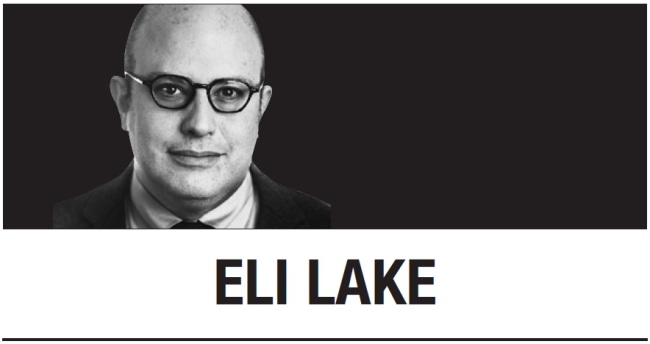For those vulnerable to displays of pageantry and pacifism, the news from the Koreas this week must have been alluring. At a moment when North Korea’s dictator is threatening the world with hydrogen bombs and long-range missiles, the North and the South agreed to march together in the Olympic ceremonies next month under a common flag.
Well, I have some bad news for the dreamers. Now is not the time to give peace a chance.
The gambit from North Korea’s leader, Kim Jong-un, is transparent to anyone paying attention. He is trying to soften up his southern, more prosperous neighbors after the UN Security Council last month approved the most far-reaching sanctions against his regime for his nuclear brinkmanship. What’s more, he is trying to get the country most threatened by his nuclear program to accept it -- at a moment when he is perilously close to perfecting a nuclear device that can survive re-entry into the atmosphere on the warhead of a missile.
Instead, now would be a good moment to ignore the Olympic diplomacy in Seoul and give a full-scale economic pressure campaign a chance. For more on the details of such a campaign, read the American Enterprise Institute’s superb Korea watcher, Nicholas Eberstadt, in the latest issue of Commentary.
He makes a few important points that policymakers at this moment should consider. To start, he says that the economic pressure campaign the US has already begun should not attempt to pressure Pyongyang into negotiations. This was the logic of the sweeping sanctions against Iran before nuclear talks began in 2013. The aim of the sanctions against North Korea should be to starve its nuclear program of the resources it needs to perfect a weapon. Pyongyang will never negotiate away its nuclear program; it must be coerced.
In this respect, the country has unique vulnerabilities. North Korea remains -- despite its official ideology and modest economic recovery -- reliant on outside aid more than any other state in the world. For more than a decade now, the biggest contributor to the Hermit Kingdom has been China. And so far, the Chinese have not been willing to cut off that lifeline.
New policies however from the Trump administration may get Beijing officials to change their mind. Late last year, the US Treasury Department issued new secondary sanctions, giving the US wide latitude to go after individuals, banks and businesses that trade with North Korea. So far, the US has been unwilling to play this card with China, but the Chinese are more vulnerable than you may think.
As Eberstadt points out, China’s largest banks are heavily leveraged. He asks, “Does Beijing really want to find out whether one of these major concerns can survive a Treasury Department-Justice Department inquiry for North Korea infringements, much less the weight of actual secondary sanctions -- or to find out what happens at home and in international financial markets if it looks as if a major Chinese bank might fail on that account?” We may learn the answer this year.
Finally, the new UN sanctions provide the basis to crack down on North Korea’s criminal revenue, ranging from slave-like guest laborers to drug and counterfeiting rings. So far, the US has had some success in getting allies to shutter North Korean embassies. This deprives the state of a base for such illicit activities. A campaign of maximum pressure will require more diplomatic isolation and cooperative law enforcement to deprive Pyongyang of revenue generated by their crimes.
To be sure, it’s unclear whether any of this will work. North Korea was willing to starve whole provinces in the late 1990s for the sake of its state ideology of self-reliance. What’s more, Eberstadt acknowledged to me an interview that no one knows how much the state has set aside for its nuclear program in the event of such sanctions. It’s possible that this part of the state’s budget could endure the maximum pressure that appears to be coming.
All of that said, we do know that the recovery of North Korea’s dreadful economy coincided with increasing the pace of its nuclear and missile tests. For the sake of world peace, let’s hope the coming economic warfare will starve a nuclear program fed by North Korea’s modest prosperity.
By Eli LakeEli Lake is a Bloomberg View columnist. -- Ed.
(Bloomberg)






